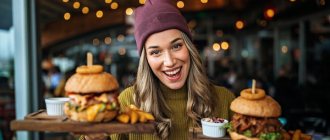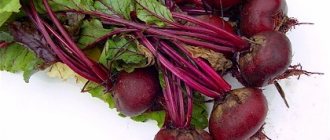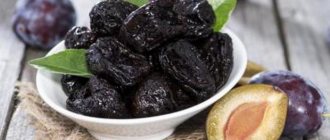Published 09/17/2020 · Comments: · Reading time: 12 min · Views: Post Views: 5,023
Welcome to the article based on the lecture on controlling appetite and physiological hunger. The mentioned lecture was recorded jointly with Galina Lebedeva. She kindly shared her experience gained while studying the stories of ordinary people who could not get their appetite and hunger under control and continued to overeat! The lecture and this article detail the 15 best, proven tips and methods to help you understand why uncontrollable hunger and increased appetite occur, causing you to overeat. This is the result of close observation of the lives of ordinary people, and not just metaphysical theorizing. Please use the information received immediately to feel the effect for yourself. In my humble opinion, this information is even too much for the average person! Galina’s speech on the topic “How to control increased appetite and not overeat to lose weight” is embedded in the article below:
Visual hunger
An eclair in a pastry shop literally screams: “Eat me!” Looking at a cookbook makes you salivate. This is eye hunger. “The sight of food triggers the release of hormones and insulin,” comments psychotherapist and nutritionist Gerard Apfeldorfer. “They sharpen the appetite.” How to control your appetite:
- Try to switch your attention and “eat” something else with your eyes, for example, a magnificent landscape or a good photograph. Perhaps this will be enough and hunger will disappear.
- Set the table and arrange food beautifully on plates, even if you are having lunch or dinner alone.
- Before you start eating, carefully examine the contents of your plate, not your iPad or iPhone.
Olfactory hunger
A person can distinguish ten thousand smells and often enjoys the aroma of food no less than its taste. Brioche, roast or steak... One fragrance can whet your appetite. To satisfy such hunger, you need:
- Inhale the aromas of the foods on the plate, just as we do with a glass of wine.
- While eating, concentrate on the smells - inhale, inhale, inhale.
- Regularly arrange an aromatherapy session with your favorite notes - vanilla, almond, cocoa - and observe what emotions they give rise to.
Eat more protein or fat
Not all foods satisfy hunger equally. Eating protein and fatty foods can reduce hunger. Research shows that protein and fat are essential to satisfy hunger and help you feel full longer.
Recommended protein-rich foods
- lean meat;
- eggs;
- beans and peas;
- nuts;
- soy products;
- yogurt.
Foods that are sources of fat:
- nuts;
- seeds;
- avocado;
- olive oil;
- cheese;
- coconut;
- eggs.
Physiological hunger
A rumbling stomach, loss of strength, mild headache, irritability indicate that it is time to replenish your energy supply. To do this you need:
- Learn to distinguish between stomach hunger (its signs are described above) and the habit of eating three times a day.
- Don't confuse hunger with anxiety: it can also cause mild cramps in the stomach area.
- Eat slowly, paying attention to the signals that the body gives us.
- Stop in the middle of a meal to assess your strength. Remember that, unlike children, adults have the right not to eat everything on their plate.
Taste hunger
It corresponds to the desire to feel a specific texture on the tongue (mousse, jelly, etc.). What feels good and what doesn't is determined by genetics, family, and culture. Our taste buds force us to eat more than we need, just for the pleasure of it. To calm them down, it’s correct:
- Try the same product in different consistencies, as is customary in Japanese cuisine. For example, alternate raw fish with boiled, grilled or battered fish.
- Eat a varied diet. It’s not for nothing that the chefs of the most famous restaurants bend over backwards to invent something unusual.
Causes of bulimia
The source of bulimia most often becomes a subconscious desire to compensate for any psychological problems. Food serves as a “comforter”, which gives life an optimistic tint and allows you to escape from pessimistic thoughts and the negativity of real life for a while.
But enjoying food is the initial stage of the disease, which passes fairly quickly. Over time, the situation is fixed in the mind as a simple and accessible model like “food = pleasure.” At the same time, there is no need to objectively enjoy food. The quality of food is replaced by its quantity, because the longer the process of eating continues, the more positive feelings you can get.
At this stage, changes occur at a different level. Taste sensations become dulled or completely disappear, an increase in the volume of the stomach and an increase in its blood supply are observed, the patient’s interests are completely shifted towards food consumption, and mental reactions become weaker - the patient is not afraid of his own reflection in the mirror, and the requests and persuasion of relatives cease to have any effect. meaning.
So, the evolutionary mechanism, which consists in the instinct to satisfy hunger, takes on a negative connotation. Now the mental model “food is a source of pleasure” is transformed into a biological dependence on food, the feeling of hunger no longer plays a role, and the desire to eat another portion often arises immediately after finishing lunch or dinner. And the person, ignoring the tension in the stomach or even the pain, continues to feed his inner “beast”.
But even food doesn’t always save you from feelings of guilt. And the patient often resorts to the most dangerous ways to compensate for his overeating. They use laxatives and diuretics, dubious folk remedies for taming appetite and losing weight, attempts to induce vomiting immediately after eating, extreme diets (which cannot be followed for a long time and only lead to a breakdown and another marathon of gluttony).
Write to WhatsApp
COST OF TREATMENT
Cellular hunger
Do you want honey when you have a cold? Chicken noodles after the flu? Chips in a summer park? These desires can either express the body’s needs for certain nutrients and microelements, or simply be a whim. To learn to feel whether these are the true aspirations of our body, it is useful to practice a little:
- When looking at a bag of chips, ask yourself: “Am I sure this will make me happier?” And until you get an answer, don’t clog your stomach.
- Always drink a glass of water before meals: thirst can easily be confused with hunger.
Choose foods high in fiber
Fiber is not broken down like other foods, so it stays in the body longer. This slows down digestion and the person feels full for a long time. Research shows that fiber may be effective in suppressing appetite. High-fiber diets are also associated with lower rates of obesity.
High fiber foods:
- whole grain;
- beans;
- fruits: apples and avocados;
- almond;
- Chia seeds;
- vegetables.
Hunger of the mind
“I should eat at least five types of fresh vegetables a day,” “dairy products are unhealthy,” etc. Such imposed rules violate a harmonious relationship with food. If you always eat according to instructions, a breakdown is inevitable. It is better not to divide dishes into healthy and harmful, but to try, for example, one day to satiate the body with some unnecessary product. Thus, psychotherapist Gerard Apfeldorfer suggests getting rid of painful addiction to sweets by eating, for example, only chocolate for several days. But it's cruel. It’s better to just eat it little by little, not forgetting to look at, smell and savor every bite. And also carefully listen to the signals of the stomach in order to stop in time. Having ceased to be forbidden, any product loses its halo of attractiveness.
Where to start eating in order to quickly satisfy your hunger and not whet your appetite. II
In order to get full faster and not eat too much, fruits, side dishes, and desserts should be left for last. By starting your meal with carbohydrates, you risk whetting your appetite and eating more than you planned. Because carbohydrates most strongly stimulate the release of insulin, which lowers blood sugar, which irritates the hunger center in the brain. Surprisingly, however, fructose has a higher potential for increasing appetite than regular glucose.
From this position it is better to start eating with fatty foods. Because fats, especially of animal origin, provide the body with maximum satiety with a minimal rise in insulin! Save side dishes, fruits, desserts and other carbohydrate sources for last. In this case, there is a high probability that fats and proteins will turn off your hunger before you get to carbohydrate sources!
How food consistency affects appetite control and satiety. III
In what form do you consume your food? Do you prefer soups and purees to whole, solid foods? This also affects the feeling of fullness. With the same amount of calories, solid food satisfies hunger better than liquid food. Therefore, juices, purees, smoothies, soups, cocktails will always leave you hungry. And this is not to mention the potential negative effect on the brain from constant consumption of liquid foods such as soups, which he described in one of his early, funny videos: how soup liquefies the brain.
Here you need to take into your head and use the following fact in life. If you eat your food solid and chew it thoroughly before swallowing, you will feel full faster. Accordingly, you satisfy your hunger with less food and leave the table earlier. This will definitely prevent overeating if, for example, you eat meat as a whole piece, and not in the form of cutlets. Same with vegetables and fruits: whole fruits will fill you up better than purees, smoothies or juices.
Remember that armored coffee with butter is also a source of liquid calories and it is easy for them to exceed the fat requirement.
How protein quality affects appetite and hunger. IV
Ask yourself, what types of protein do you prefer? It is widely known that the amino acid composition determines how well the selected protein satisfies hunger and turns off appetite.
Plant-based proteins are the worst way to satisfy your hunger, because they rarely contain the full range of amino acids. Therefore, many vegetarians feel hungry throughout the day and often eat to get all the amino acids they need.
Excessively lean, low-fat protein sources can also fuel an increased appetite. For example, lean white fish such as tilapia and dairy products with artificially reduced fat content (cottage cheese, cheese, kefir). Some seafood and fish have a sweet aftertaste, which indicates the presence of carbohydrates in them. Perhaps these are glycogen residues. However, for those who are especially sensitive to sweet taste and even addicted to it, it can stimulate an appetite that will be difficult to control.
Remember that protein foods that retain their natural fat content best satisfy your hunger. For example, herbivorous meat such as beef and horse meat. The darker the meat, the more minerals it contains. Moreover, a higher degree of saturation after its use should be expected. Light-colored protein sources will always be inferior to dark-colored protein sources in their ability to make you feel full.
I recommend: Why is everyone afraid of red meat and is it worth it?
How does the amount of protein control increased appetite? V
This section has something in common with the previous paragraph, but the question is posed differently: “Are you getting from food the amount of protein your body needs to renew itself?” If, thanks to the previous section, you began to choose higher quality protein products, now all that remains is to fulfill your quota daily! This is guaranteed to help you control your increased appetite and avoid overeating. For example, when you really want sweets, this may indicate a momentary lack of certain amino acids such as glutamine, tyrosine, tryptophan, etc.
For a comprehensive understanding of the role of protein in appetite control, it is important to read this article : How Protein Controls Eating Behavior.
To calculate your protein intake, use this article : How much protein can the kidneys and liver process without harm?
Cut down on fats that don't satisfy your hunger and cause you to overeat. VI
Fats that stimulate appetite and cause overeating include polyunsaturated fats. Among them, omega-6 fatty acids occupy a special place. These fats are found in large excess in vegetable oils. If you like to indulge in flaxseed, sunflower, or olive oils, then reducing them to a minimum will increase the ability of mitochondria to burn their own fat reserves. Use saturated fats of animal origin because they satisfy hunger faster and do not warm up the appetite as much as polyunsaturated fats. Moreover, animal fats behave much more stable and safer when heated. Feel free to cook with them!
Most likely, omega-3 fats also have a similar effect. However, in modern conditions they are not as accessible as omega-6. Far fewer people overindulge in wild-caught red fish than snacks fried in industrial vegetable oils, right?
Useful articles on the topic: How to make omega-3 and fish oil work. Saturated fats in the prevention of gallstones.
How does food volume affect appetite control? VII
The more you eat empty foods like vegetables, the more it will whet your appetite later. Foods high in fiber, such as fruits and vegetables, are often low in calories. However, they have a high volume. Yes, I know that everywhere you are advised to fill your stomach with cabbage and other broccoli. And I myself used to give such advice to my wards, because I came out of the same system. However, I continued my education and found out that this is not helpful advice in the long term.
If you stuff your insides with empty food (fruits, vegetables, greens) in large quantities, then you deceive the feeling of hunger for a short moment. However, then the feeling of hunger returns with even greater force, because the mechanical stretching of the digestive system did not coincide with the energy and biological value the brain expected to receive in this volume.
Stay away from the advice “Eat more vegetables to stretch your stomach and deceive hunger.” Because on the one hand you will get irritation and inflammation of the intestines due to excess fiber, and on the other hand your appetite and hunger will return with a vengeance!
Oh yeah! The topic of the benefits (or harms?) of fiber is another big rabbit hole ! If you really dive into it, then only in the company of pathophysiology expert Konstantin Monastyrsky. I advise you to start studying the topic with our joint podcast: Fiber for the intestines: a gift from heaven or a trick of the devil?
How the state of enzyme systems controls hunger. Hydrochloric acid and increased appetite. VIII
Galina Lebedeva considers this point her own discovery. According to her position, when a person does not eat enough of nutritious sources of protein (eggs, beef), it is worth considering whether the stomach produces enough hydrochloric acid to digest and absorb this protein.
If filling sources of protein like eggs and meat don't fill you up, try sucking on a pinch of salt before eating to stimulate the production of more acidic stomach juices. If this does not work, then contact a gastroenterologist to evaluate the condition of your mucous membrane. When the lining of the stomach is damaged (gastritis, etc.), a specialist should guide you through a rehabilitation protocol that will restore stomach function so you can digest food better. You will be more effectively satisfied with the same amount of food as before, preventing overeating.
How alcohol increases your appetite and causes you to overeat. IX
Alcoholic drinks always stimulate the feeling of hunger and weaken volitional control. This is an axiom that cannot be ignored. It’s not for nothing that the concept of “aperitif” exists in European cuisines. This is a low-alcohol drink that is served before meals to increase appetite. If alcohol is an integral part of your daily menu, then this is a very alarming sign. Look for a way to get rid of this addiction. Otherwise, in 5-10 years, it will no longer be possible to rehabilitate you.
Keep a very simple rule in your brain: “The less alcohol in my life, the healthier my mind and body.”
To find your way of getting rid of various kinds of addictions, I recommend that you read my book “The World in Man.” For example, a chapter about coffee addiction.
How drinking food affects appetite and hunger. X
The more drinks you drink during meals, the worse your hunger will be satisfied. There are many mechanisms at play here. For example, by doing this you reduce the concentration of digestive enzymes, so food can be digested more slowly. The slower the digestion and absorption of nutrients, the later hunger is satisfied. Because amino acids, fatty acids and glucose from food reach the brain more slowly, telling it that food has already entered the body and the feeling of hunger can be turned off.
To avoid overeating, try not to drink too much liquid during and after meals.
If you are tormented by recommendations like: “Drink 8 glasses/2 liters of water a day,” then I recommend protecting yourself with the following article: Drinking water is as easy as breathing!
How to chew food to satisfy your hunger faster and control your appetite. XI
Yes, you already understand that it is better to eat food in solid form. However, in order to get enough and forget about the abyss inside you, you need to not just eat a piece of meat, but chew it thoroughly before swallowing. I recommend thoroughly chewing any food that goes into your mouth. You must liquefy the solid piece into a liquid before swallowing. Chewing thoroughly not only helps fill you with less food, but also relieves the stomach.
And also ask yourself the question: “What is it that I eat that I try to swallow as quickly as possible and forget it?” Is this something disgusting that needs to be swallowed for show? When eating, the process is important because the result is already known. Enjoy every bite and then you won't have to swallow the whole carcass! If you don't enjoy the process of chewing, then you're either not hungry or there's something wrong with your food.
Some types of protein can increase food addiction. XII
At the moment, two types of protein are known that can cause addictive eating behavior in predisposed people. These are wheat protein - gluten, and milk protein - casein. When digested, gluten is converted into gliadinomorphine . If you consume dairy products that contain A1 casein, caseomorphine is formed during its digestion . Gliadinomorphine and caseomorphine bind to opioid receptors, which may increase the pleasure of their consumption, causing addiction . Yes, they are much weaker than heroin. But this effect may explain the widespread dependence on bread and dependence on dairy products.
It is unlikely that this point will concern everyone. But I advise those who cannot live a day without bread and dairy products to take a closer look at it. It is important to remember that A2-type milk morphine .
How the quantity and quality of sleep affects appetite and hunger. XIII
If you find it difficult to control your eating behavior, you are probably in a deep degree of asthenia. If, against this background, you are negligent about the quality and quantity of your sleep, then this is the first thing that needs to be eliminated in order to regain the ability to eat harmoniously. Each episode of poor quality sleep increases your risk of overeating the next day. Print yourself the slogan between the convolutions: “ Lack of sleep - Overeat!” “. This is such an important and serious point. Restore your sleep quality to eliminate 80% of your food problems.
I encourage you to also explore the topic of sleep quality and neuroplasticity in this chapter of my book: Sleep and Neuroplasticity
How specific combinations of nutrients affect hunger and increase appetite. XIV
There is a specific combination of macronutrients that maximally stimulates increased appetite. Such foods include: nuts and seeds, chocolate, dairy products. Let me not repeat myself and save our time. I described this topic in detail in the article: What food increases appetite. What foods cause overeating. Please read it to understand the biological essence of the listed foods.
I urge you not to be surprised if nuts and seeds, chocolate, and dairy products give you great pleasure and cause you to overeat. It's not your choice. This food is created by nature so that you eat as much of it as possible.
Emotional hunger
This is the story about him about the Madeleine cake, told by Marcel Proust. We associate childhood memories with specific foods or dishes. We eat them not for the taste, but to feel comfort, love and warmth again. Emotions are transferred to food, and this has nothing to do with hunger. The same thing happens when, with the help of treats, we try to cheer ourselves up, disperse boredom, brighten up loneliness, drown out anxiety, etc. How to deal with this?
- If you want to restore mental comfort, console yourself with a small portion, enjoying every crumb.
- Before eating, call a loved one, listen to your favorite music, take a fragrant bath. Perhaps the hunger will subside.
How to change eating behavior
To resolve an eating disorder, it is necessary to determine the reasons that led to weight gain or loss. You may need a slight correction - for example, taking care of yourself in company or stopping the urge to go to the refrigerator when you are in a bad mood.
It is important to find an additional resource in case of disorder, which will allow you not to depend on food - sports, drawing or any other hobby. It is necessary to secure adequate food rules. It is better to do this with a doctor, and not with the help of diets from the Internet. Strict dietary restrictions provoke violations and do not contribute to health and excellent appearance.










